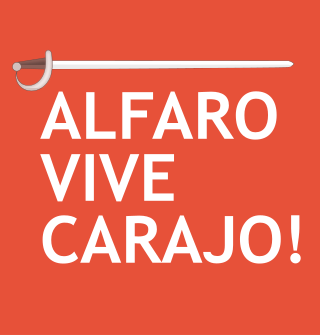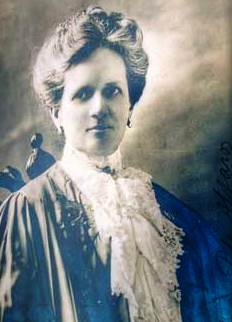
Lucio Edwin Gutiérrez Borbúa served as 43rd President of Ecuador from 15 January 2003 to 20 April 2005.

José Eloy Alfaro Delgado often referred to as "The Old Warrior," was an Ecuadorian politician who served as the President of Ecuador from 1895 to 1901 and from 1906 to 1911. Eloy Alfaro emerged as the leader of the Liberal Party and became a driving force protect fairness, justice and liberty. He became one of the strongest opponents of the pro-Catholic conservative President Gabriel García Moreno (1821–1875). The "Viejo Luchador" played a central role in the Liberal Revolution of 1895 and fought against conservatism for almost 30 years.

José María Velasco Ibarra was an Ecuadorian politician. He became president of Ecuador five times, in 1934–1935, 1944–1947, 1952–1956, 1960–1961, and 1968–1972, and only in 1952–1956 he completed a full term. In his four other terms, he was removed by military force, and several times he was installed as president through a military coup.
The Alfarista Radical Front was a centrist liberal party in Ecuador, founded in 1972. One of its best known figures was former acting president Fabián Alarcón.
This article gives an overview of political liberalism and radicalism in Ecuador. It is limited to liberal and radical parties with substantial support, mainly proved by having had representation in parliament. The sign ⇒ means a reference to another party in that scheme.

Lizardo García Sorroza was President of Ecuador from 1 September 1905 to 15 January 1906.

¡Alfaro Vive, Carajo! (AVC), another name for the Fuerzas Armadas Populares Eloy Alfaro, was a clandestine left-wing group in Ecuador, founded in 1982 and named after popular government leader and general Eloy Alfaro. The group was labeled as a terrorist organization for the Ecuadorian state during the period of the former president León Febres Cordero, existing between 1983 to 1991, years where they carried out various armed actions and criminal acts in Ecuador, with Colombian influence (M-19) and Nicaraguan. The group was initially formed sometime in the 1970s, but was not active militarily for the first few years of the 80's.

Montecristi is a town in the Manabí province of Ecuador and the capital of Montecristi Canton.

This is a summary of the history of Ecuador from 1860 to 1895. Gabriel García Moreno is the father of Ecuadorian conservatism and no doubt the most controversial figure in the nation's history, condemned by Liberal historians as Ecuador's worst tyrant but exalted by Conservatives as the nation's greatest nation-builder. In the end, both appraisals may be accurate; the man who possibly saved Ecuador from disintegration in 1859 and then ruled the nation with an iron fist for the subsequent decade and a half was, in fact, an extremely complicated personality. Born and raised under modest circumstances in Guayaquil, he studied in Quito, where he married into the local aristocracy, then traveled to Europe in the aftermath of the 1848 revolutionary uprisings and studied under the eminent Catholic theologians of the day.

This is a summary of the history of Ecuador from 1895-1925. Eloy Alfaro is the outstanding standard-bearer for Ecuador's Liberals, much as Gabriel García Moreno is for the Conservatives. Some Marxist groups have also looked to Alfaro; although his political program was in no way socialist, it did prove to be revolutionary in the extent to which it stripped the Roman Catholic Church of the power and privileges previously granted to it by García Moreno. Catholic officials and their Conservative allies did not give up without a fight, however. During the first year of Alfaro's presidency, Ecuador was ravaged by a bloody civil war in which clergymen commonly incited the faithful masses to rise in rebellion against the "atheistic alfaristas" and were, just as commonly, themselves victims of alfarista repression. The foreign-born Bishops Pedro Schumacher of Portoviejo and Arsenio Andrade of Riobamba led the early resistance to Alfaro. A fullfledged bloodbath may well have been averted only through the magnanimous efforts of the outstanding historian and Archbishop Federico González Suárez, who urged the clergy to abandon the pursuit of politics.

Federico González Suárez (1844–1917) was an Ecuadorian priest, historian and politician who served as the Archbishop of Quito for twelve years. Prior to becoming the Archbishop of Quito, he served as a senator in the Ecuadorian government in 1894 and then as the Bishop of Ibarra from 1895 to 1905.
The Conservative Party was an Ecuadorian conservative party formed in 1869. Initially associated with the military of Ecuador the PC became one of the two great parties of state in the country, alternating in power with the Ecuadorian Radical Liberal Party. Its traditional support basis has been amongst the landowning classes, as well as merchants and artisans and it tended to favour a unitary structure rather than federalism.

The Liberal Revolution of 1895 took place in Ecuador, and was a period of radical social and political upheaval. The Revolution started on June 5, 1895 and ultimately resulted in the overthrow of the conservative government, which had ruled Ecuador for several decades, by the Radical Liberals, led by Eloy Alfaro. After the revolution, the new government legalized divorce, allowed religious freedom, and weakened the authority of the Church, which lost the land it held.
Richelieu Levoyer Artieda was an Ecuadorian Army General and politician. He was the son of painter Jorge Levoyer and educator Delia Maria Artieda.
The Citizens' Revolution was a political and socioeconomic project formulated by a coalition of left-wing politicians with a variety of social organizations in Ecuador. Through the implementation of the Citizens' Revolution, President Rafael Correa, who was the leader of PAIS Alliance, has sought since 2008 to gradually achieve the socialist reconstruction of Ecuadorian society.
The Concha Revolution (1912–1916) was an outcome of the assassination of liberal Ecuadorian leader Eloy Alfaro -- responsible for the Liberal Revolution of 1895 -- on January 28, 1912, in Quito. In the north of Ecuador, the citizens of Esmeraldas, especially the Afro-Esmeraldans, were loyal to the liberal cause and the ensuing struggle left many of the poorly armed blacks dead at the hands of government troops. This uprising in support of Alfaro was against a more conservative wing of the Liberal party. Ecuadorian blacks contributed notably to the military effort and even formed the bulk of Alfaro’s army in the region. The Esmeraldan rebel army was led and funded by Colonel Carlos Concha y Torres (1864–1919). This civil war left a bitter legacy in the region.
Julio Martinez Acosta was an Ecuadorian Lieutenant and politician. He served as the youngest military leader under Ecuador President, Eloy Alfaro.
Events in the year 1912 in Ecuador.

The Citizen Revolution Movement is a democratic socialist political party in Ecuador formed by supporters of former President Rafael Correa who distanced themselves from Correa's former PAIS Alliance party during the presidency of Lenín Moreno. The party takes its name from the term used to refer to the project of building a new society.

Ana Paredes Arosemena was the wife of Eloy Alfaro, the president of Ecuador on two occasions. She was therefore First Lady of the Nation, first between 1895 and 1901, and second between 1906 and 1911.












